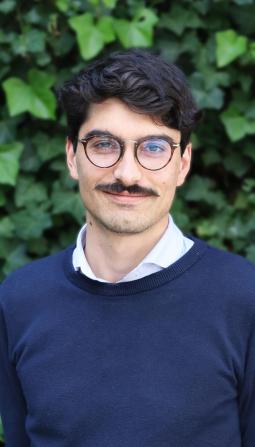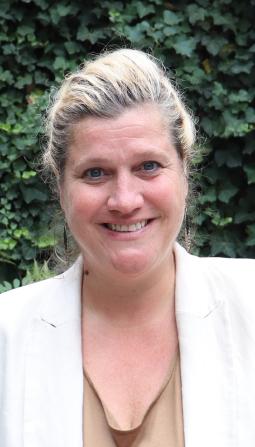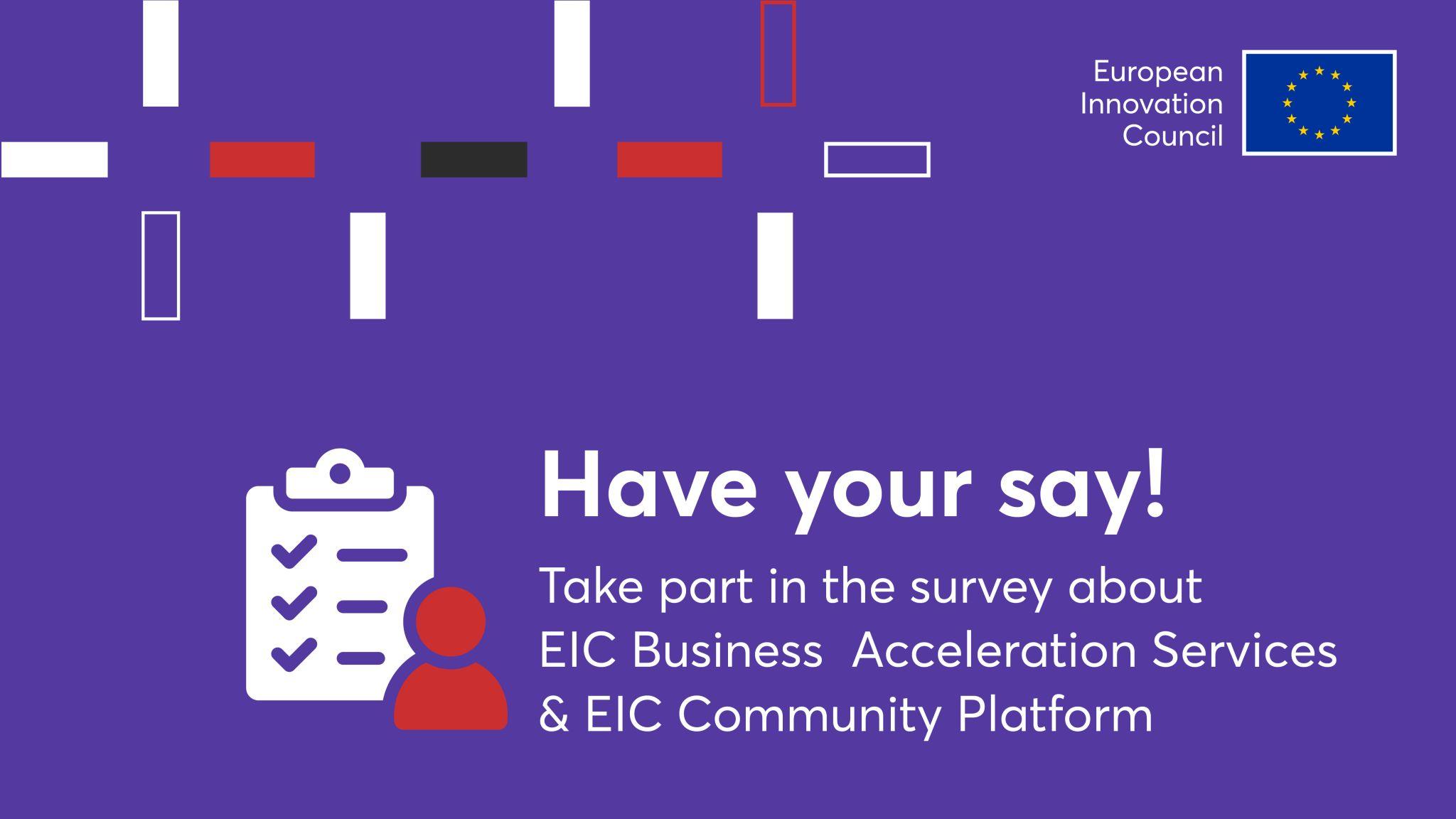
The EIC launches a consultation on its Business Acceleration Services
The European Innovation Council (EIC) is launching a survey open to EIC beneficiaries, aiming to collect information regarding the use of the EIC Community Platform and the EIC Business Acceleration Services.
The survey is open until 12 April 2024. You can access it through this link.
Within the framework of Horizon Europe, the European Innovation Council (EIC) provides comprehensive support beyond financial backing, with the overarching goal of expediting innovation and fostering the growth of leading deep-tech enterprises.
- The EIC Business Acceleration Services (BAS) is open to all EIC beneficiaries — researchers, innovators or entrepreneurs — to address specific needs and is available at every stage of their venture's development cycle.
- The EIC Community Platform is the digital space created by the EIC to nurture its ecosystem of European innovators, offering a space for networking and knowledge-sharing. It serves as a collective hub for access to EIC Business Acceleration Services, connecting peers, accessing resources, and participating in group discussions and events.
By answering the survey, you can participate in the improvement of those tools and ensure that they match the needs of EIC beneficiaries.
- Rodolphe Doité
- 27/03/2024
-
Working Group
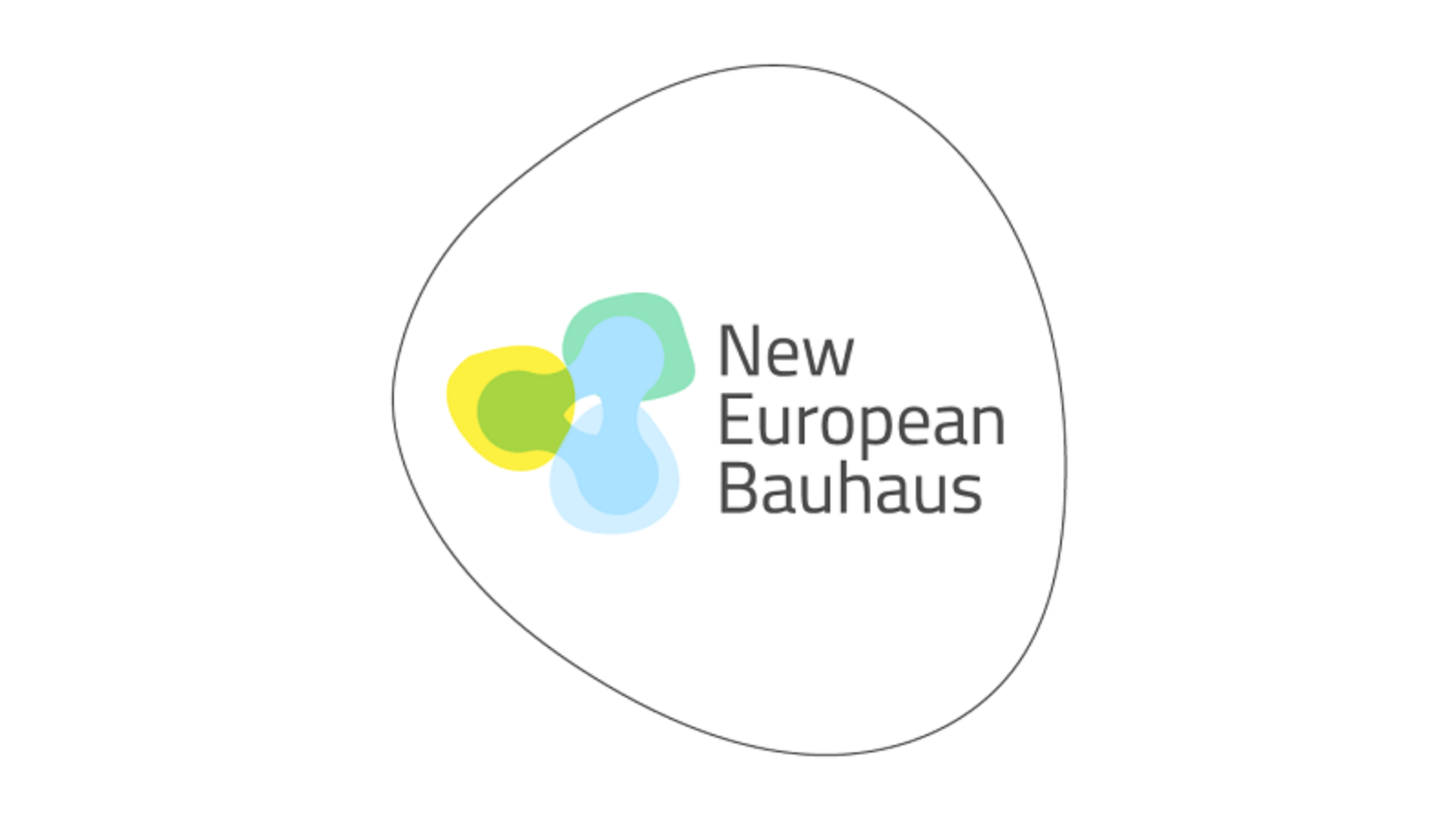
New NEB Facility will support the NEB from 2025 to 2027
This week marks the adoption of the NEB Facility, the first multi-annual budget support tool for the New European Bauhaus from 2025 to 2027. It aims to create and scale up innovative solutions that can revitalise European neighbourhoods through design for sustainability and inclusion.
The NEB Facility will be anchored in the Horizon Europe Strategic Plan 2025-2027 and will have two components:
- The Research & Innovation component will research and develop innovative out-of-the-box solutions to bring people and green transformation together, with an indicative budget of EUR 120 million per year until 2027.
- The roll-out component will cover deployment and technical assistance with support from various EU programmes around topics and priorities to be identified.
The NEB Facility is set to bring stability for investment and creativity, helping the NEB movement unfold its full potential and generate new and improved ways of doing, thinking and policy-making with impactful results.
The European Commission is working on the next steps, including a consultation process involving Member States, the NEB Community and key stakeholders, such as European networks like ERRIN. Through the work and active engagement of the NEB Task Force, ERRIN has been promoting and sharing the NEB principles and approaches across sectors since its creation in early 2023. ERRIN members have actively contributed to shaping the future of the NEB by providing inputs to the European Commission based on place-based experiences and challenges. These inputs have been collected by ERRIN and submitted to the European Commission consultation process opened in December 2023.
ERRIN has joined the NEB Alliance as one of the founding members, connecting and boosting collaboration opportunities with other relevant projects and initiatives such as CrAFT, LivinginEU, NEB-STAR, Re-value, joining forces and building synergies with other key EU initiatives such as the EU missions.
The ERRIN New European Bauhaus Task Force is now planning a NEB Satellite Event on the role of regions and cities in shaping the future of the NEB. The meeting will present the key findings and recommendations from the ERRIN input paper and showcase successful stories and inspiring examples of embedding NEB principles across sectors and initiatives.
In view of the upcoming project opportunities on the NEB, ERRIN invites all members to stay informed and keep an eye on its new Project Development Tool, which connects members and shares funding opportunities directly pulled from the EU funding portal.
- Francesca Pozzebon
- 26/03/2024
-
Working Group
Francesca Pozzebon
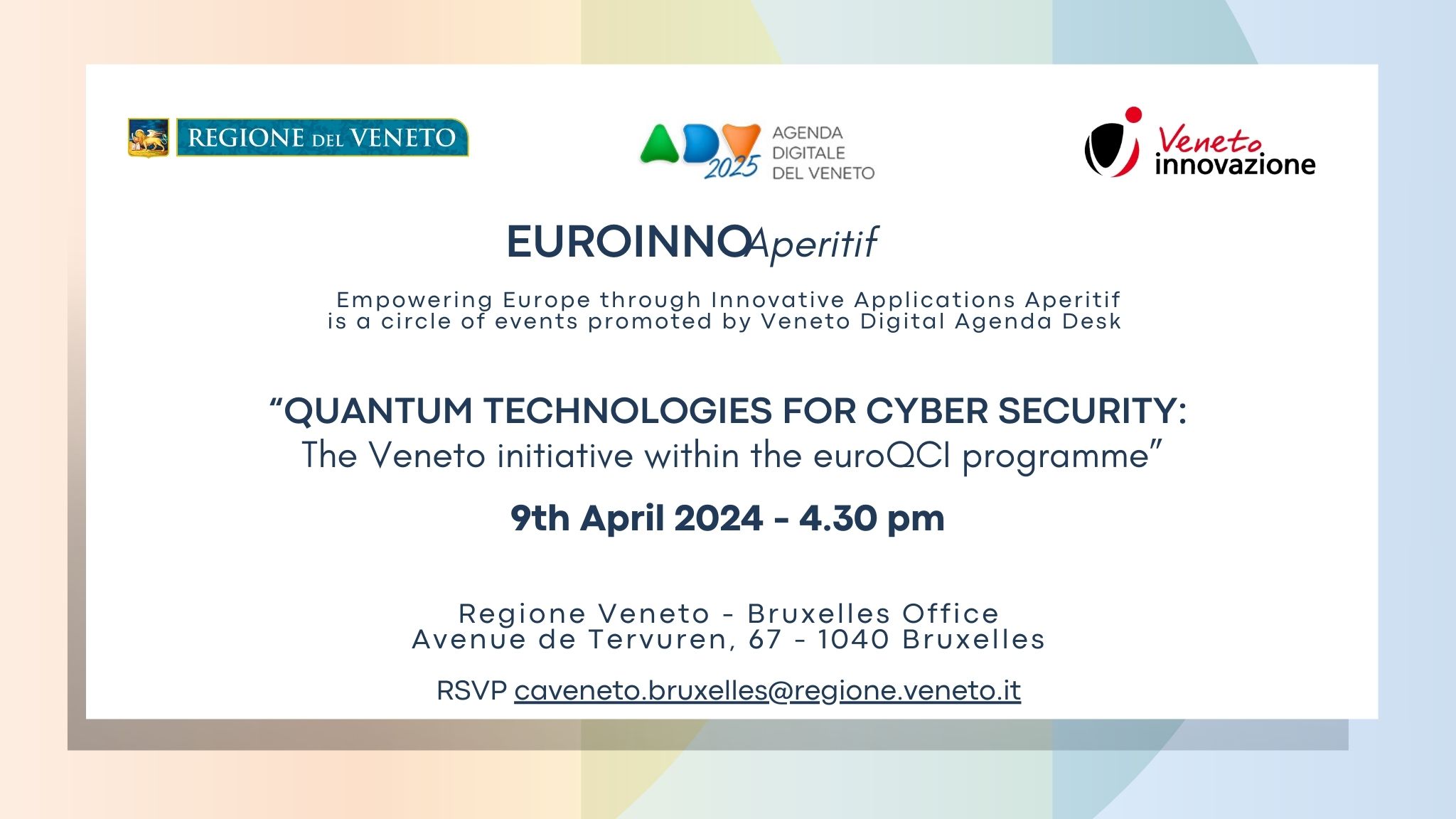
Quantum Technologies for Cybersecurity: the Veneto initiative within the euroQCI programme
The EuroINNOAperitif event, organised by Veneto Regione, Veneto Innovazione and Veneto Digital Agenda Desk, will serve as a platform to discuss and promote innovative applications aimed at empowering Europe.
The upcoming session, titled "Quantum Technologies for Cyber Security: The Veneto Initiative within the euroQCI Programme," will delve into the crucial intersection of quantum technologies and cybersecurity. Scheduled for 16:30 on 9 April 2024, the event will take place at the Regione del Veneto - Bruxelles Office in Avenue de Tervuren 67 in Brussels.
This gathering promises to be an enlightening opportunity for professionals and stakeholders to explore the advancements and implications of quantum technologies in safeguarding digital infrastructure.
Please register for the event here.
- 09/04/2024 - 16:30 - 09/04/2024 - 17:30
- Vittoria Ghirardelli
-
Member
-
Working Group
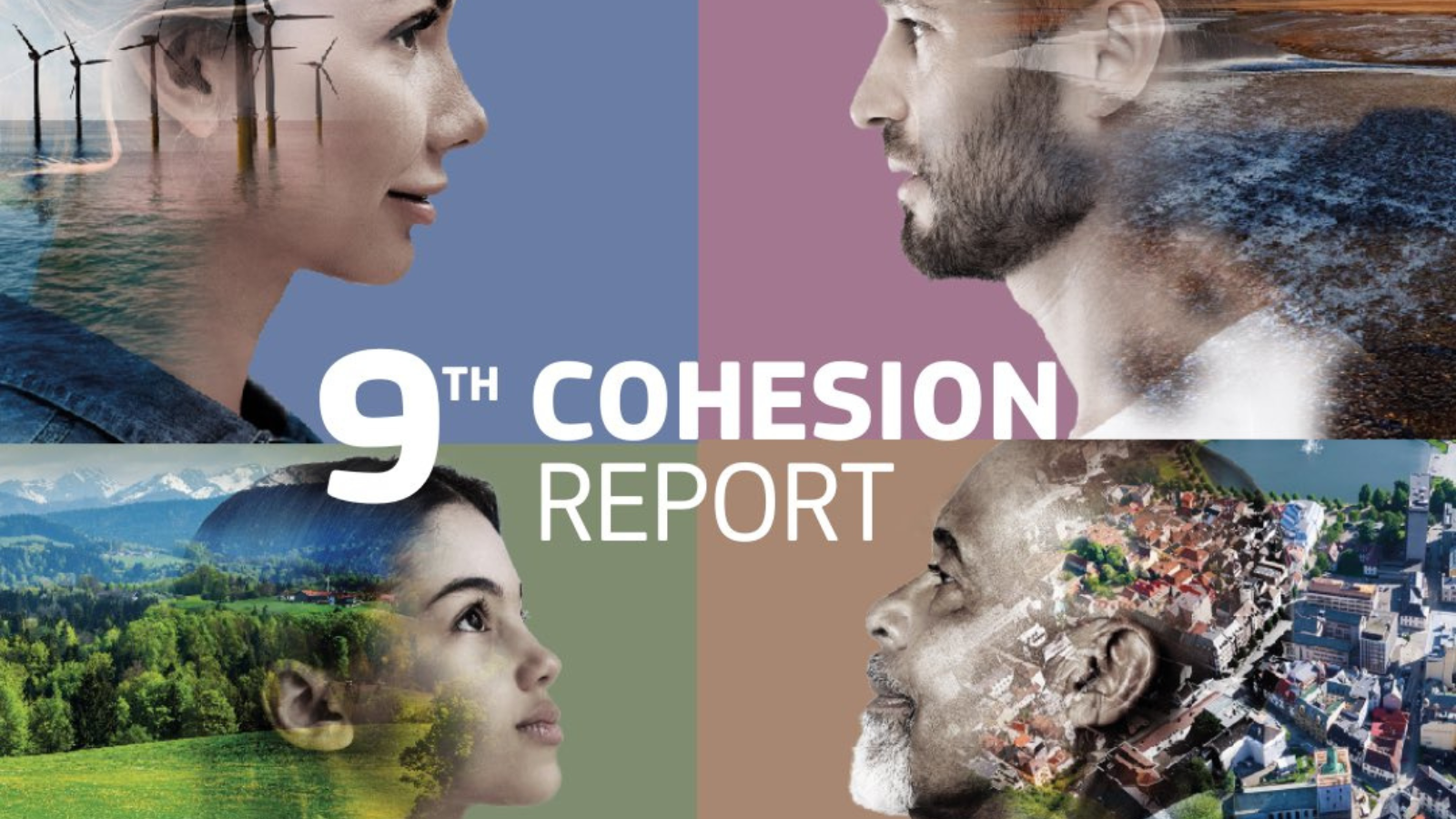
9th Cohesion Report is published
On 27 March, the Commission published the 9th Cohesion Report. The document presents an assessment of the state of cohesion in the Union, showing that the Cohesion Policy is fulfilling its mission to narrow economic, social, and territorial disparities across the EU, while drawing lessons for the future.
One of the nine report chapters is focused on regional innovation and digital transition. Among its findings, the report draws attention to the persisting innovation divide and advocates a differentiated, place-based approach to fostering innovation as essential for promoting economic convergence across regions and reducing the innovation gap.
Looking forward, the report comments on remaining challenges such as sub-national disparities between large metropolitan areas and other regions, and those regions caught in a ‘development trap' and that are lagging behind, as well as demographic changes further impacting these challenges.
Drawing lessons from the implementation of Cohesion Policy, while taking into account the experience of other instruments such as the Recovery and Resilience Facility, the Communication on the 9th Cohesion Report points to the need to reflect on how to improve the design of the Policy to better deliver on its Treaty objectives. Some aspects include addressing emerging economic dynamics and new imbalances, tailoring support to regional needs, faster implementation, further simplification, stronger performance orientation and linkage with reforms, and built-in flexibilities to react to unforeseen events.
These reflections link to the ongoing ERRIN work around the future of cohesion policy post-2027 and its R&I dimension, with our first messages on the topic shared in August last year.
A first discussion of the findings from the 9th Cohesion Report will take place during the upcoming 9th Cohesion Forum, 11-12 April 2024 in Brussels. Representatives from stakeholders to national, regional, and local authorities, will reflect on how Cohesion Policy can continue to ensure that no region is left behind in the ongoing structural changes.
Read the Commission's press release here and find the full report alongside highlights and interactive maps here.
The Cohesion Report is published by the Commission every three years to assess the state-of-play of the EU's economic, social, and territorial cohesion, present progress made and lessons learned, and show the EU's role as a driver for regional development. The Report is data-driven: it analyses the evolution of cohesion according to a wide range of indicators, such as prosperity, employment, education levels, and governance.
- Ewa Chomicz
- 27/03/2024
-
Working Group
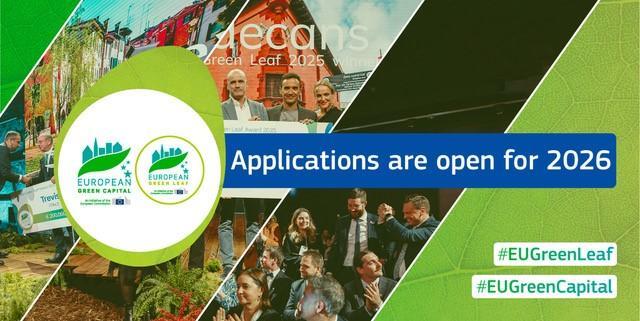
Apply for the European Green Capital & European Green Leaf Awards 2026
European cities committed to sustainability are encouraged to apply for the 2026 edition of the European Green Capital and Green Leaf Awards before the deadline on 30 April 2024. The Awards promote and reward the efforts of European towns and cities that strive to reduce their impact on the local and global environment, improving the quality of life for their inhabitants.
The European Green Capital Award is open to cities with over 100,000 inhabitants. Smaller cities can apply for the European Green Leaf Award, open to all towns and cities with more than 20,000 inhabitants. The winner of the Green Capital Award will receive €600,000, and up to two Green Leaf winners will receive €200,000 each. The financial prize contributes to supporting the winning cities in implementing initiatives and measures to enhance their environmental performance and reach out to citizens.
The winning cities will not only be joining the ever-growing network of leading European cities that share a common vision and expertise but will also benefit from positive media coverage, increased international profile, new opportunities and partnerships, and invitations to high-level events.
Learn more about the awards here and watch the workshop organised for potential applicant cities here.
- Heidi Johansson
- 26/03/2024
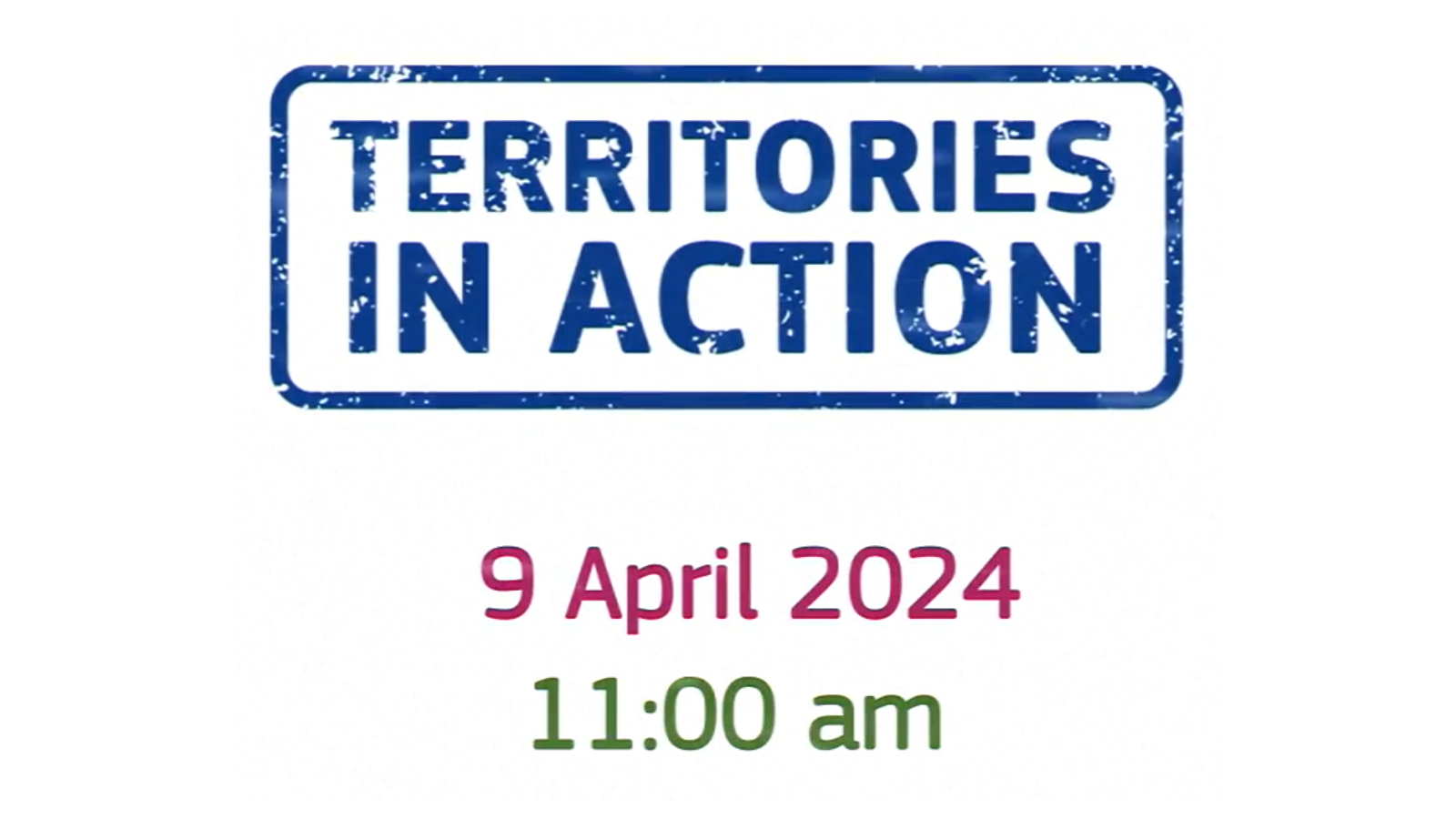
Territories in ACTION
Between 2022-2023, over 45 ERRIN members participated in the Partnerships for Regional Innovation (PRI) Pilot Action supported by the Joint Research Centre of the European Commission and the European Committee of the Regions (CoR). The PRI was proposed as a new approach to place-based innovation policy which builds on positive experiences with smart specialisation strategies. Continuing the work on innovation for place-based transformations, in January 2024, the ACTIONbook was released by JRC and CoR, offering practices and tools to empower local, regional and national stakeholders to drive societal well-being and climate-resilient development through strategic partnerships and purpose-driven actions.
Following its publication, the ACTIONbook will now be presented and fleshed out in a live-streamed event on 9 April from 11:00-12:30. Several territories will showcase their innovative transformations, alongside testimonies from the President of the Committee of Regions, EU Commissioners for Regional Policy and Research and Innovation, and European Parliament representatives. As the ACTIONbook builds on the experiences from the PRI Pilot Action, next steps linked to this initiative will also be shared.
Learn more on the new Innovation for place-based transformations website here and follow the event live here.
- 09/04/2024 - 11:00 - 09/04/2024 - 12:30
- This meeting will take place online
- Ewa Chomicz
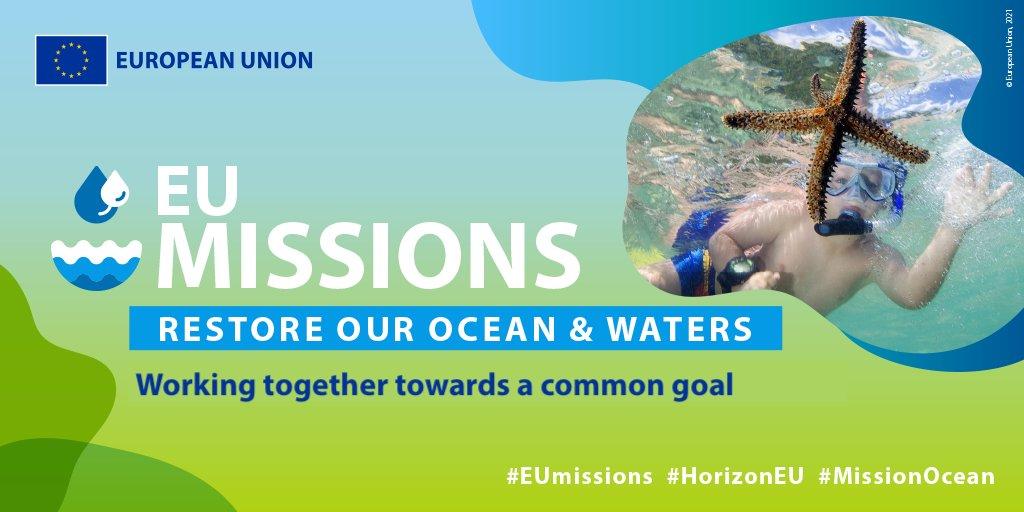
Mission Ocean and Waters Technical Assistance Call
On 22 March, the European Commission launched a call for technical assistance to provide support to communities of stakeholders working with ports, islands and fisheries. Set within the strategic sea basins of the Mission - the Mediterranean, Atlantic & Arctic, Danube, and North & Baltic Sea - this technical assistance aims to empower and guide these communities towards impactful and sustainable feasibility studies for their projects to achieve the Ocean and Waters Mission objectives.
Who are these communities?
1. Ports: e.g. local or regional authorities (including regional agencies, regional planning bodies, regional transport authorities), port authorities, non-governmental organisations (NGOs) involved in port development, professional associations committed to local development initiatives.
2. Islands: e.g. local and regional authorities (including regional agencies, regional planning bodies, regional transport authorities), NGOs active in local development efforts, and professional associations dedicated to addressing island-specific challenges.
3. Fisheries: e.g. local and regional authorities (including regional agencies, regional planning bodies, regional transport authorities), NGOs focused on fisheries communities, professional associations engaged in regional development, researchers dedicated to preserving marine ecosystems, and individuals directly involved in fishing activities.
Objectives and benefits of the technical assistance:
The primary objective of the technical assistance is to align with the specific needs, capacities, and interests of the selected communities. Through tailored expert guidance across regulatory, technical, economic, operational, environmental and commercial dimensions, the technical assistance seeks to enhance the effectiveness and sustainability of projects undertaken by these communities. It is important to note that while financial support is not provided under this initiative, participants can expect comprehensive feasibility studies aimed at evaluating project viability, identifying risks and opportunities and offering actionable recommendations for improvement.
Facilitated by a dedicated technical expert group with the support of CINEA and the Mission Secretariat, the technical assistance typically spans a duration of 4-6 months. Applications can be submitted in any of the 24 official EU languages.
Timeline:
The Call for Expression of Interest will be conducted in two distinct cycles:
- Cycle 1: 22 March 2024 to 24 May 2024 at 23:59 CEST, with the selection of successful applicants expected to be communicated by the end of June 2024.
- Cycle 2: Scheduled for September/October 2024 to November/December 2024 (exact dates to be confirmed). This will also provide an opportunity for unsuccessful Cycle 1 candidates to resubmit their applications alongside new applicants.
For more details and to access the application form, visit the website.
- Silvia Ghiretti
- 25/03/2024
-
Working Group
Silvia Ghiretti
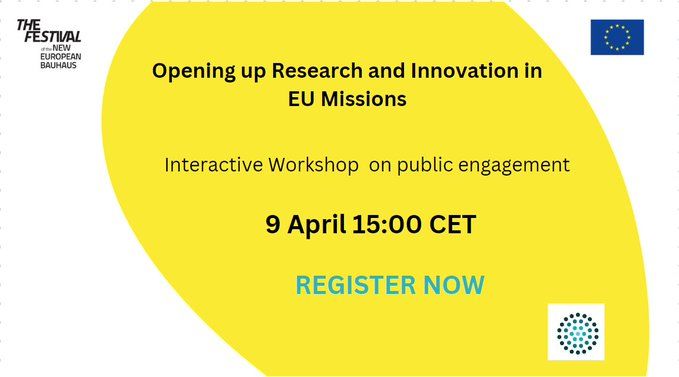
Opening up Research and Innovation processes in EU Missions: Interactive Workshop
Open Responsible Research and Innovation has a big potential in getting Europe closer to reaching its five Missions. It can produce huge societal benefits by nurturing more inclusive R&I ecosystems and by developing closer collaboration between organisations of different natures to create solutions that are aligned with societal values, needs and expectations of the citizens.
As part of the New European Bauhaus Festival, the REINFORCING project will be running a workshop on Open Responsible Research and Innovation. During this interactive and participatory workshop, participants will have a chance to discover practical examples of how public engagement and co-creation processes can be used in the context of EU missions and share the challenges faced in implementing these processes. The workshop will be designed using participatory methods to ensure all voices are equally valued and heard.
The REINFORCING project will offer grants of up to € 60,000 to support organisations implementing open innovation, such as societal engagement. This will be the third of a series of calls that the project is launching to strengthen Open Responsible Research and Innovation practices all over Europe and its Associated Countries. It will be addressed at organisations active in any of the five EU missions willing to tap into the power of open innovation but in need of incentives to undertake this journey. REINFORCING will not only support these organisations financially but also with specific training, capacity-building sessions, mentoring opportunities and peer learning.
Learn more and register for the event here.
- 09/04/2024 - 15:00 - 09/04/2024 - 16:30
- This meeting will take place online
- Francesca Pozzebon
-
Working Group
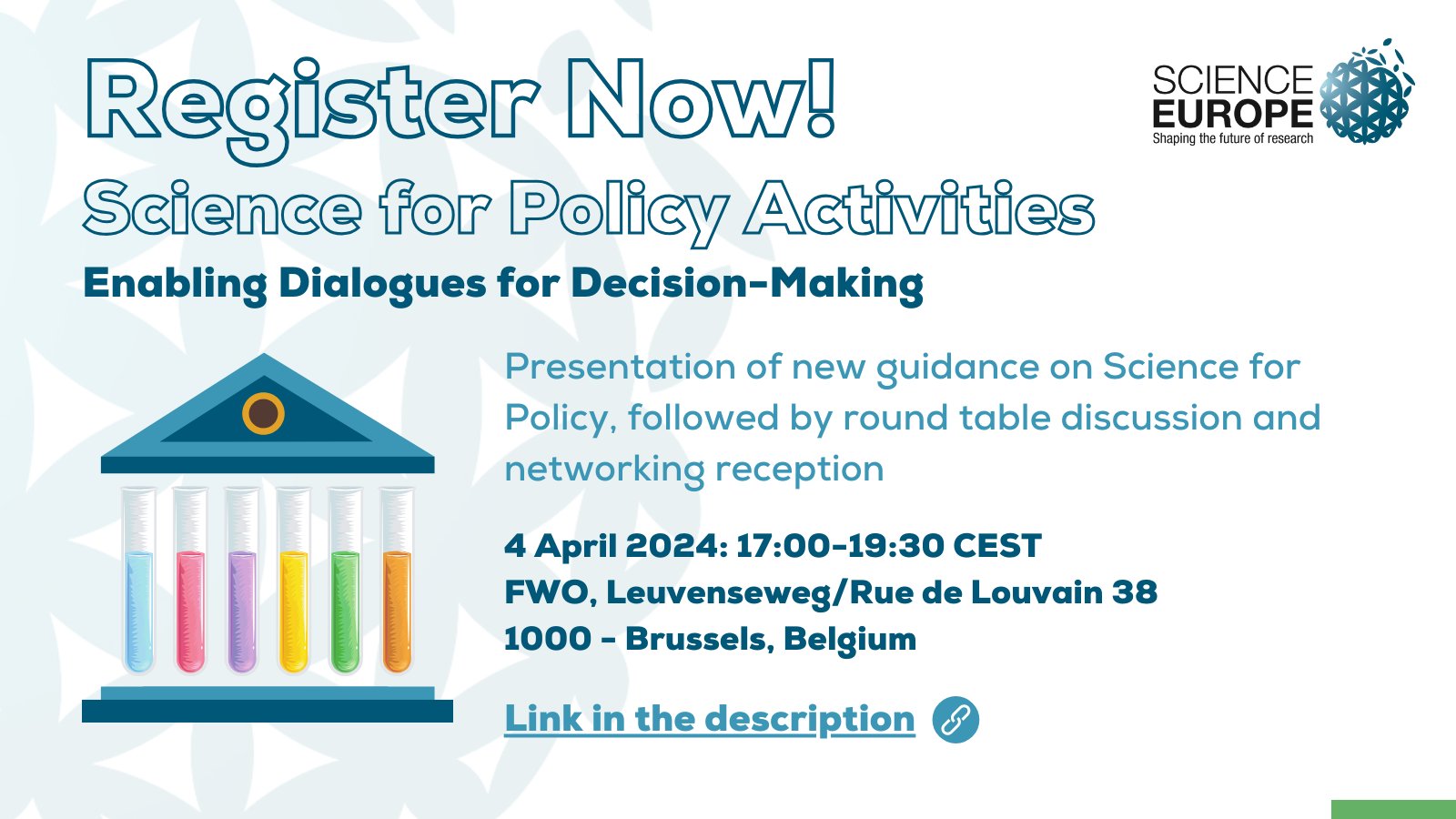
Science for Policy Activities: Enabling Dialogues for Decision Making
This Science Europe event will present the Science Europe Guidance on Science for Policy activities of Science Europe. The event is an opportunity to discuss the new guidance with a high-level panel of research organisation leaders directly engaged in science for policy activities in the context of geopolitical tension, ethical considerations, increasing digitalisation, and the emergence of Artificial Intelligence.
Based on the 2023 report Science Policy in Action: Insights for the Green and Digital Transition, the Guidance aims to:
- Define Science for Policy activities in the case of Science Europe Member Organisations.
- Present the principles and values.
- Propose actions for designing and operating Science for Policy Activities.
- Provide examples.
- Discuss cross-cutting challenges.
The Guidance will be discussed with a high-level panel of research organisations’ leaders directly engaged in science for policy activities.
More information
You can find the event programme attached. You can register via this link.
This topic is of interest to ERRIN Science and Education for Society Working Group, which organised in 2023 a meeting on how to bridge the gap between researchers and policymakers.
- 04/04/2024 - 17:00 - 04/04/2024 - 18:45
-
Research Foundation Flanders (FWO)
Rue de Louvain 38
1000 Brussels
Belgium - Astrid Hannes
-
Working Group
Astrid Hannes

Consortium looking for an expert in digital divide- Deadline 27 March
The future European research project “Territorial perspectives of digital transition in European regions” aims to provide new evidence on the development and territorial diffusion of digital divides. It shall comprehend the drivers behind and analyse available data at the relevant territorial scales (at least NUTS 3) in order to provide an overview of digital transition trends in different types of European territories. In addition, this European research project shall address the socioeconomic impact of the digital transition. The main target groups are national and regional/local level administrations, which will be working on digital transition roadmaps in order to achieve the targets of Europe’s Digital Decade.
You can find more information here and in the document attached.
A consortium led by Polimi and Technopolis Group is looking for experts for this project.
The expert panel will have a review function for the project. In particular, their role will entail providing feedback on the deliverables produced and participating in a selected number of online workshops organised within the project (three or four at this stage). The role presents a valuable opportunity for active engagement and influence over project outcomes.
To apply:
- Europass CV
- Short biography
- Signing the attached letter of intent
If interested, please conact rodolphe.doite@errin.eu by Wednesday, 27 March 12:00.
- Rodolphe Doité
- 25 March 2024
-
Deadline27 March 2024
